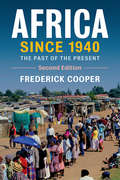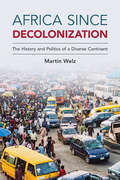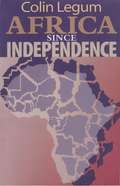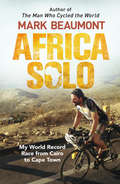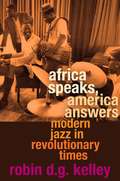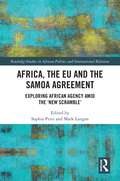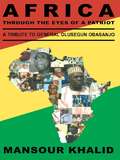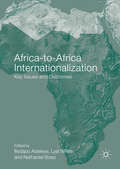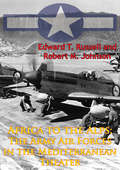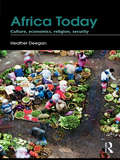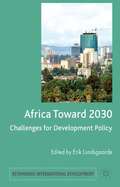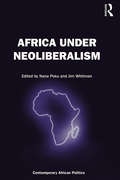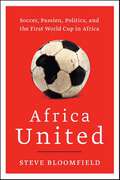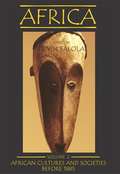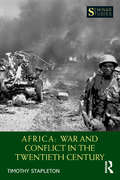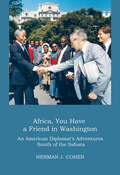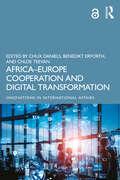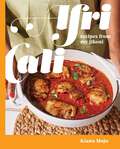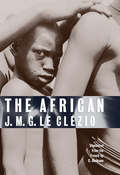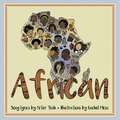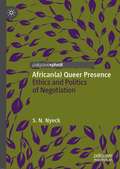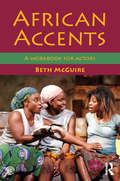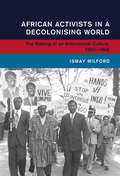- Table View
- List View
Africa since 1940: The Past of the Present (New Approaches to African History #13)
by Frederick CooperAfrica since 1940 is the flagship textbook in Cambridge University Press' New Approaches to African History series. Now revised to include the history and scholarship of Africa since the turn of the millennium, this important book continues to help students understand the process out of which Africa's position in the world has emerged. A history of decolonisation and independence, it allows readers to see just what political independence did and did not signify, and how men and women, peasants and workers, religious and local leaders sought to refashion the way they lived, worked and interacted with each other. Covering the transformation of Africa from a continent marked by colonisation to one of independent states, Frederick Cooper follows the 'development question' across time, seeing how first colonial regimes and then African elites sought to transform African society in their own ways. He shows how people in cities and villages tried to make their way in an unequal world, through times of hope, despair, renewed possibilities, and continued uncertainties. Looking beyond the debate over what or who may be to blame, Cooper explores alternatives for the future.
Africa Since 1940
by Frederick CooperFrederick Cooper's latest book on the history of decolonization and independence in Africa helps students understand the historical process from which Africa's current position in the world has emerged. Bridging the divide between colonial and post-colonial history, it shows what political independence did and did not signify and how men and women, peasants and workers, religious leaders and local leaders sought to refashion the way they lived, worked, and interacted with each other.
Africa since Decolonization: The History and Politics of a Diverse Continent
by Martin WelzHome to more than 1.2 billion people, living in 54 recognized states, speaking around 3,000 languages, Africa is a diverse and complex continent made up of states which differ in regard to their colonial history, political system, socio-economic development, economic polices and their experience with crises and conflicts. This introduction and overview of African history and politics since decolonization emphasises throughout, the diversity of the continent. Organised thematically to include chapters on decolonization and its legacies, external influences, economics, political systems, inter-African relations, crises, conflicts and conflict management, and Africa's external relations, Martin Welz strikes a fine balance between the use of contextual information, analysis, case studies and examples with theoretical debates in development, politics and global policy. Accessible to students at all levels, it counters histories which offer reductive explanations of complex issues, and offers new insights into the role African actors have played in influencing international affairs beyond the continent.
Africa since Independence
by Colin LegumActivist, scholar, and political journalist Colin Legum assesses Africa's experience since independence and offers judicious predictions about the continent's future. Covering 50 years of sweeping change, this provocative and insightful book examines Africa's struggle for democracy, mounting economic problems, and AIDS.
Africa Solo: My World Record Race from Cairo to Cape Town
by Mark BeaumontSHORTLISTED FOR ADVENTURE TRAVEL BOOK OF THE YEARIn the spring of 2015, Mark Beaumont set out from the bustling heart of Cairo on his latest world record attempt - solo, the length of Africa, intending to ride to Cape Town in under 50 days. Seven years since he smashed the world record for cycling round the world, this would be his toughest trip yet. And he would set a new mark that would simply break the limits of endurance.Despite illness, mechanical faults, attempted robbery and stone-throwing children, as well as dehydration in the deserts and unprecedented levels of exhaustion, Mark completed the journey in just 41 days, 10 hours and 22 minutes, after cycling 6,762 miles, spending 439 hours in the saddle (sometimes up to 16 hours a day) and climbing 190,355 feet through 8 countries. It was an astonishing journey, and one that will fascinate and grip the reader.From the obvious dangers of Egypt, Sudan and Kenya, over the unpaved, muddy, mountainous roads of Ethiopia, through the beautiful grasslands of Tanzania and Zambia, to riding at night in Botswana in the company of elephants and giraffes, Mark brings Africa to life in all its complex glory, friendship and curiosity, while inspiring us all to question the bounds of what is possible.
Africa Speaks, America Answers
by Robin D. G. KelleyIn Bedford-Stuyvesant, Brooklyn, pianist Randy Weston and bassist Ahmed Abdul-Malik celebrated with song the revolutions spreading across Africa. In Ghana and South Africa, drummer Guy Warren and vocalist Sathima Bea Benjamin fused local musical forms with the dizzying innovations of modern jazz. These four were among hundreds of musicians in the 1950s and ’60s who forged connections between jazz and Africa that definitively reshaped both their music and the world. Each artist identified in particular ways with Africa’s struggle for liberation and made music dedicated to, or inspired by, demands for independence and self-determination. That music was the wild, boundary-breaking exultation of modern jazz. The result was an abundance of conversation, collaboration, and tension between African and African American musicians during the era of decolonization. This collective biography demonstrates how modern Africa reshaped jazz, how modern jazz helped form a new African identity, and how musical convergences and crossings altered politics and culture on both continents. In a crucial moment when freedom electrified the African diaspora, these black artists sought one another out to create new modes of expression. Documenting individuals and places, from Lagos to Chicago, from New York to Cape Town, Robin Kelley gives us a meditation on modernity: we see innovation not as an imposition from the West but rather as indigenous, multilingual, and messy, the result of innumerable exchanges across a breadth of cultures.
Africa, the EU and the Samoa Agreement: Exploring African Agency Amid the ‘New Scramble’ (Routledge Studies in African Politics and International Relations)
by Sophia Price Mark LanganThis edited volume provides a timely and critical analysis of Africa‑EU Relations in the new Samoa Agreement phase of the long‑standing ‘Eurafrican’ relationship.Drawing on a range of critical perspectives and contributions it moves beyond Eurocentric visions of policy co‑operation on development to highlight three core themes that frame the analysis within this volume: the new scramble for Africa, Europe’s ontological security and the securitisation of development and African agency. In doing so, it assesses EU actors’ engagement with African institutions in relation to key areas of policy collaboration, including trade, development, health, migration and security. In this context, it examines whether the ‘partnership’ offers African states and regional institutions a genuine pathway to ‘development’ or whether historical power asymmetries remain entrenched – and perhaps even exacerbated – through the new Africa‑EU Agreement.This book will be of key interest to scholars, students and practitioners involved in Development Studies, EU studies, Africa‑EU Relations, African politics and International Relations and more broadly to International Political Economy and Comparative Regionalism.
Africa Through The Eyes Of A Pat
by KhalidGeneral Olusegun Obasanjo was recently elected president in the first Nigerian free and popular elections held after fifteen years of military rule. Having voluntarily given over his power to civilians in 1979, Obasanjo has since dedicated himself to Pan-Africanism, conflict resolution in Africa, and regional and international cooperation. "Africa Through the Eyes of a Patriot" is a collection of his most memorable speeches from the 1980s to the present, touching on issues as varies as democracy and policy-making to human rights and the environment.
Africa-to-Africa Internationalization: Key Issues and Outcomes (AIB Sub-Saharan Africa (SSA) Series)
by Ifedapo Adeleye Lyal White Nathaniel BosoHighlighting an important emerging trend in FDI to Africa, thisbook consists of important contributions focusing on an increase in trade andinvestment between African countries. An area that until now has receivedlittle attention, this volume aims to define the key issues and explores thechallenges and outcomes that have characterized Africa-to-Africainternationalization, providing guidance on directions for future research. Africa-to-Africa Internationalizationincludes both conceptual and empirical contributions, illustrating thepractical issues in intra-African trade and investment. Providing readers witha deep sense of the realities and challenges of cross-border investments withinthe region, the cases included in the book are useful pedagogical materials forfaculty members interested in teaching international business in the Africancontext.
Africa To The Alps: The Army Air Forces In The Mediterranean Theater [Illustrated Edition]
by Edward T. RussellIncludes over 14 photos and mapsBy the time the U.S. declared war on Germany and Italy on December 11, 1941, most of Europe had fallen under the domination of Adolf Hitler, dictator of Germany's Third Reich. In the west, only Great Britain, her armies expelled from the European continent, remained defiant; in the east, Hitler faced an implacable foe-the Soviet Union. While the Soviets tried to stave off a relentless German attack that had reached Moscow, Britain and her Commonwealth allies fought a series of crucial battles with Axis forces in North Africa.Initially, America's entry into the war changed nothing. The U.S. continued to supply the Allies with the tools of war, as it had since the passage of the Lend-Lease Act in March 1941. U.S. military forces, however, had to be expanded, trained, equipped, and deployed, all of which would take time.With the U.S. in the war, the Allies faced the question of where American forces could best be used. President Franklin D. Roosevelt and British Prime Minister Winston S. Churchill had already agreed that defeating first Germany and then Japan would be their policy, but that decision raised further questions.Roosevelt wanted U.S. troops in combat against German troops as soon as possible. Josef Stalin, the Soviet leader, demanded a second front in northern Europe to relieve pressure on his armed forces. Churchill, fearing German power in France, hoped for a strike at the Mediterranean periphery of Hitler's conquests-what he called the "soft underbelly" of Europe.Churchill proposed an invasion of northwest Africa for late 1942 and Roosevelt agreed...Africa to the Alps describes the participation of the Army Air Forces in the war in the Mediterranean theater of operations, as it developed a practical air-ground doctrine, established an effective interdiction strategy, and gained valuable experience in airborne operations and close air support of ground troops.
Africa Today: Culture, Economics, Religion, Security
by Heather DeeganIn the post 9/11 global environment Africa is standing at a crossroads in international affairs as the combined issues of politics, religion and security attract renewed interest. While some countries seem to be moving forward with greater levels of confidence, democracy and stability, others continue to be mired in conflict, poverty and religious/ethnic division. This text focuses on key contemporary issues that the continent faces, providing a comprehensive introduction of current political, religious, developmental and security concerns. Features include: Individual chapters devoted to key issues including health, gender, corruption, religion and the newly emerging problems of human security. Case studies and detailed analysis of topical issues, including: Muslim/Christian clashes: Kano, Northern Nigeria Conflict, Arms and Reconstruction: Darfur and Sierra Leone Comprehensive range of countries discussed including: Zimbabwe, Botswana, Kenya Ethiopia, Uganda, Lesotho, Somalia, Namibia and Madagascar. Fully up-to-date statistics including primary research based on interviews conducted by the author, providing data for both individual countries and the continent as a whole. Boxed descriptions explaining clearly the ideas in important subject areas, such as Islamic law and society By drawing on the author’s empirical research and situating discussion within the context of wider debate, Africa Today is designed both to introduce and to develop a deeper understanding of this rapidly changing continent an essential text for all students of African politics and International Relations.
Africa Toward 2030
by Erik LundsgaardeWith the deadline of the Millennium Development Goals approaching, governments are considering the main elements for a global development policy reference system after 2015. Adapting insights from the scenario analysis tradition, the contributors identify six major underlying causes of change and key uncertainties affecting Africa's development prospects. The drivers of change considered vital in shaping Africa's future include demography, climate change, technology and innovation, domestic political development, new actors in international development, and global governance. The book outlines several generalized scenarios for the continent's future and discusses the implications of the changing African development context for the priorities and organization of European development cooperation.
Africa Under Neoliberalism: A Century Of Struggle And Quest For Legitimacy (Contemporary African Politics)
by Nana Poku Jim WhitmanThe period since the 1980s has seen sustained pressure on Africa’s political elite to anchor the continent’s development strategies in neoliberalism in exchange for vitally needed development assistance. Rafts of policies and programmes have come to underpin the relationship between continental governments and the donor communities of the West and particularly their institutions of global governance – the International Financial Institutions. Over time, these policies and programmes have sought to transform the authority and capacity of the state to effect social, political and economic change, while opening up the domestic space for transnational capital and ideas. The outcome is a continent now more open to international capital, export-oriented and liberal in its political governance. Has neoliberalism finally arrested under development in Africa? Bringing together leading researchers and analysts to examine key questions from a multidisciplinary perspective, this book involves a fundamental departure from orthodox analysis which often predicates colonialism as the referent object. Here, three decades of neoliberalism with its complex social and economic philosophy are given primacy. With the changed focus, an elucidation of the relationship between global development and local changes is examined through a myriad of pressing contemporary issues to offer a critical multi-disciplinary appraisal of challenge and change in Africa over the past three decades.
Africa United: Soccer, Passion, Politics, and the First World Cup in Africa
by Steve BloomfieldAfrica United is the story of modern day Africa told through its soccer. Travelling across thirteen countries, from Cairo to the Cape, Steve Bloomfield, the former Africa Correspondent for The Independent, meets players and fans, politicians and rebel leaders, discovering the role that soccer has played in shaping the continent. This wide-ranging and incisive book investigates Africa’s love of soccer, its increasing global influence, the build-up to the 2010 World Cup itself and the social and political backdrop to the greatest show on earth.
Africa Volume 2: African Cultures and Societies Before 1885
by Toyin FalolaAfrica: Volume 2 adopts a new perspective on African history and culture, surveying the wide array of societies and states that have existed on the African continent and introducing readers to the diversity of African cultural expressions.
Africa: War and Conflict in the Twentieth Century (Seminar Studies)
by Timothy StapletonThis book examines the causes, course and consequences of warfare in twentieth century Africa, a period which spanned colonial rebellions, both World Wars, and the decolonization process. Timothy Stapleton contextualizes the essential debates and controversies surrounding African conflict in the twentieth century while providing insightful introductions to such conflicts as: African rebellions against colonial regimes in the early twentieth century, including the rebellion and infamous genocide of the Herero and Nama people in present-day Namibia; The African fronts of World War I and World War II, and the involvement of colonized African peoples in these global conflicts; Conflict surrounding the widespread decolonization of Africa in the 1950s and 1960s; Rebellion and civil war in Africa during the Cold War, when American and Soviet elements often intervened in efforts to turn African battlegrounds into Cold War proxy conflicts; The Second Congo Civil War, which is arguably the bloodiest conflict in any region since World War II; Supported by a glossary, a who’s who of key figures, a timeline of major events, a rich bibliography, and a set of documents which highlight the themes of the book, Africa: War and Conflict in the Twentieth Century is the best available resource for students and scholars seeking an introduction to violent conflict in recent African history.
Africa, You Have a Friend in Washington: An American Diplomat's Adventures South of the Sahara
by Herman J. CohenDuring nineteen years of overseas duty in the Foreign Service, the author served in five U.S. embassies in Africa, including a term as ambassador to the Republic of Senegal. The book highlights the author’s experiences south of the Sahara, both as Foreign Service officer and as assistant secretary of state for Africa in the George H. W. Bush administration. It is a source of useful information for American university students or recent graduates who are considering pursuing careers in the international sector.
Africa–Europe Cooperation and Digital Transformation (Innovations in International Affairs)
by Chux Daniels, Benedikt Erforth and Chloe TeevanAfrica–Europe Cooperation and Digital Transformation explores the opportunities and challenges for cooperation between Africa and Europe in the digital sphere. Digitalisation and digital technologies are not only essential for building competitive and dynamic economies; they transform societies, pose immense challenges for policymakers, and increasingly play a pivotal role in global power relations. Digital transformations have had catalytic effects on African and European governance, economies, and societies, and will continue to do so. The COVID-19 pandemic has already accelerated the penetration of digital tools all over the globe and is likely to be perceived as a critical juncture in how and to what purpose the world accepts and uses new and emerging technologies. This book offers a holistic analysis of how Africa and Europe can manage and harness digital transformation as partners in a globalised world. The authors shed light on issues ranging from economic growth, youth employment, and gender, to regulatory frameworks, business environments, entrepreneurship, and interest-driven power politics. They add much-needed perspectives to the debates that shape the two continents’ digital transformation and innovation environments. This book will interest practitioners working in the areas of innovation, digital technologies, and digital entrepreneurship, as well as students and scholars of international relations. It will also be relevant for policymakers, regulators, decision-makers, and leaders in Africa and Europe.
AfriCali: Recipes from My Jikoni (A Cookbook)
by Kiano MojuTurn readily available ingredients and pantry staples into easy yet flavorful weeknight meals and dinner party dishes that celebrate a unique fusion of Nigerian, Kenyan, and Californian cuisines. From jollof rice and Swahili chicken biriyani to spice blends and peri-peri recipes, discover the best of African flavors and Cali flair—without ever leaving your kitchen.Kiano Moju was born to a Kenyan mother and a Nigerian father and raised in California. While she spent her summer breaks in Kenya, her home in the states during the school year held African house parties where Nigerian jollof rice, moin moin (steamed bean cakes), roasted chicken legs, and plantains were a common part of life. On weekends and special occasions, they would make Kenyan dishes like samosas, sauteed collard greens, barbecued meat, and other favorites from her childhood including Ethiopian and Eritrean recipes. As Kiano says, &“Californian cuisine embraces the flavors of its immigrant communities while celebrating the state&’s agriculture and the flavors of fresh produce,&” and that&’s the concept behind her cooking. AfriCali is not a traditional cookbook, but rather one inspired by the delicious meals Kiano has experienced in life. The recipes are unfussy but dedicated to flavor including: Peri Peri Butter Herby Harissa Lentil Nuggets Cherry Tomato Kachumbari Kijani Seafood Pilau Chicken and Okra Wet Fry Berbere Braised Short Ribs Coconut and Cardamom Mandazi Garlic Butter Chapos Pili Pili Pineapple Margarita The gorgeous food photography as well as photos from the author&’s travels in Africa make this a cookbook like no other. Dive in and enjoy the delicious, unique meals that the whole family will love.
The African
by J. M. G. Le ClézioThe African is a short autobiographical account of a pivotal moment in Nobel-Prize-winning author J. M. G. Le Clézio's childhood. In 1948, young Le Clézio, with his mother and brother, left behind a still-devastated Europe to join his father, a military doctor in Nigeria, from whom he'd been separated by the war. In Le Clézio's characteristically intimate, poetic voice, the narrative relates both the dazzled enthusiasm the child feels at discovering newfound freedom in the African savannah and his torment at discovering the rigid authoritarian nature of his father. The power and beauty of the book reside in the fact that both discoveries occur simultaneously.
African: A Children's Picture Book (LyricPop #0)
by Peter ToshAn AALBC Recommended New Book! Included in Publishers Weekly's Children's Galleys to Grab at Winter Institute! A beautiful children's picture book featuring the lyrics of Peter Tosh's global classic celebrating children of African descent. So don't care where you come from As long as you're a black man, you're an African No mind your nationality You have got the identity of an African African is a children's book featuring lyrics by Peter Tosh and illustrations by Jamaican artist Rachel Moss. The song "African" by Peter Tosh was originally released in 1977 on his second solo record, Equal Rights. He wrote the song during a time of civil unrest in Jamaica as a reminder to all black people that they were part of the same community. The album is considered one of the most influential reggae works of all time. A key song from the classic 1970s era of reggae Peter Tosh was one of the founding members of the iconic reggae group the Wailers
African(a) Queer Presence: Ethics and Politics of Negotiation
by S.N. NyeckTo achieve something by way of negation is not just to state a difference. It is to impose a certain kind of violence and domination on things so ordered around for the sake of epistemic, religious, or political expediency also. The notion of queerness presented in this book takes the view that the process of conceptualizing selves “out-of-order” is fundamentally anti-dialectical, negotiated, political and spiritual. Queerness negation manifested as a form of colonial and postcolonial epistemic and political violence defines reality as the clash of ideal and non-ideal categories. The demand to achieve something by way of negation that dialectics imposes on itself is costly because it treats negation as inevitable. From an anti-dialectical standpoint, analyses of the films Proteus and Karmen Geï deal with the processes of freeing queer selves from colonial and postcolonial negation. The book reflects on the conditions and possibilities of queerness affirmation as an ethics of presence grounded in the politics of negotiation following the proposition of nego-feminism and the practical humanism of Senghor to offer an ethical and embodied vision of an ecological depth of feeling and will as foundational to relational possibilities within the African(a) world.
African Accents: A Workbook for Actors
by Beth McGuireThis is a comprehensive workbook for actors, covering the key characteristics and profiles of a wide range of African accents of English. Its unique approach not only addresses the methods and processes by which to go about learning an accent, but also looks in detail at each example. This lets the reader plot their own route through the learning process and tailor not only their working methods but also their own personal idiolect. Full breakdowns of each accent cover: an introduction giving a brief history of the accent, its ethnic background, and its language of origin preparatory warm-up exercises specific to each accent a directory of research materials including documentaries, plays, films and online resources key characteristics such as melody, stress, pace and pitch descriptions of physical articulation in the tongue, lips, jaw, palate and pharynx practice sentences, phoneme tables and worksheets for solo study. African Accents is accompanied by a website at www.routledge.com/cw/mcguire with an extensive online database of audio samples for each accent. The book and audio resources guide actors to develop their own authentic accents, rather than simply to mimic native speakers. This process allows the actor to personalize an accent, and to integrate it into the creation of character rather than to play the accent on top of character.
African Activists in a Decolonising World: The Making of an Anticolonial Culture, 1952–1966 (Global and International History)
by Ismay MilfordAs wars of liberation in Africa and Asia shook the post-war world, a cohort of activists from East and Central Africa, specifically the region encompassing present-day Malawi, Zambia, Uganda and mainland Tanzania, asked what role they could play in the global anticolonial landscape. Through the perspective of these activists, Ismay Milford presents a social and intellectual history of decolonisation and anticolonialism in the 1950s and 1960s. Drawing on multi-archival research, she brings together their trajectories for the first time, reconstructing the anticolonial culture that underpinned their journeys to Delhi, Cairo, London, Accra and beyond. Forming committees and publishing pamphlets, these activists worked with pan-African and Afro-Asian solidarity projects, Cold War student internationals, spiritual internationalists and diverse pressure groups. Milford argues that a focus on their everyday labour and knowledge production highlights certain limits of transnational and international activism, opening up a critical – albeit less heroic – perspective on the global history of anticolonial work and thought.
